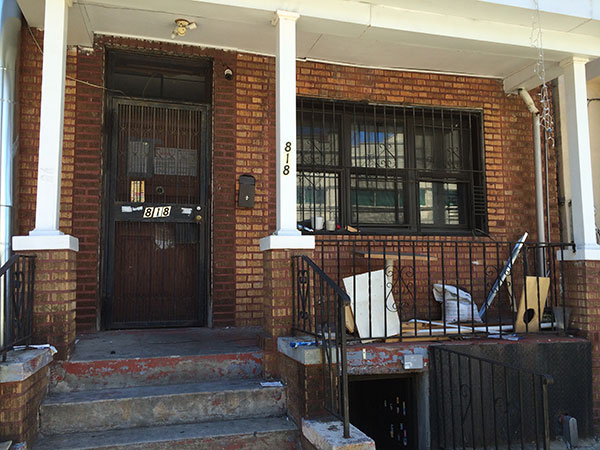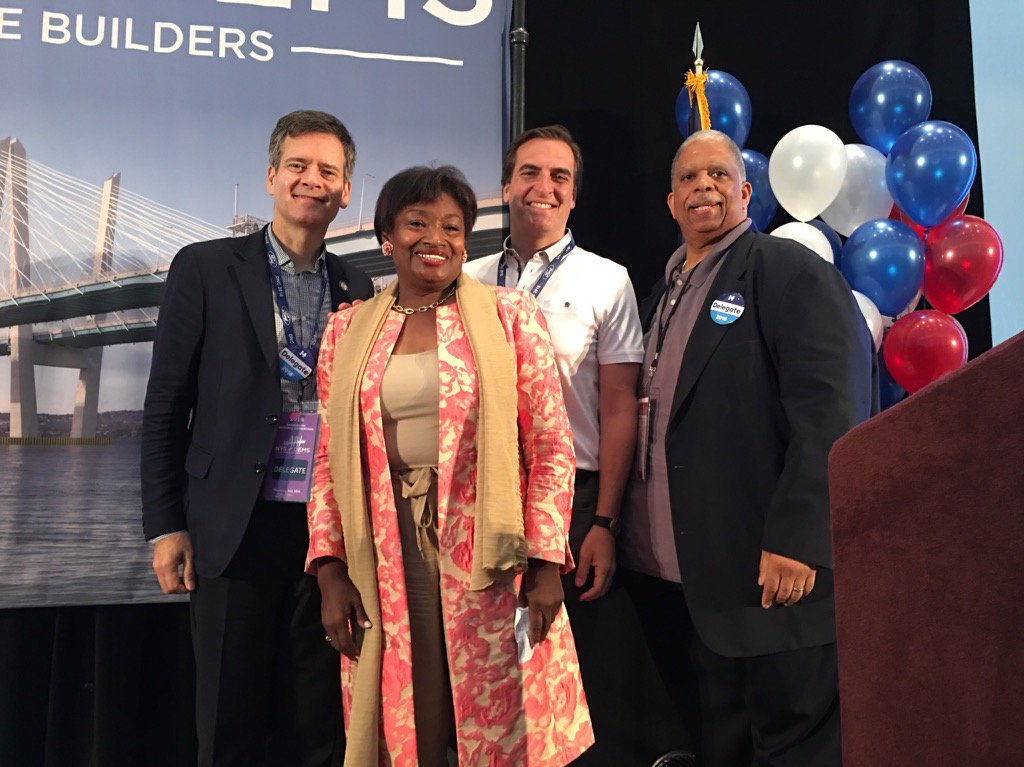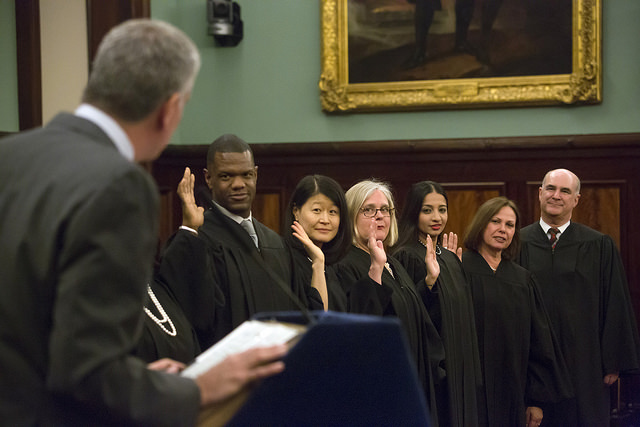Illegal Conversions and South Brooklyn’s Affordable Housing Crisis

A home that has been illegally converted (photo: Tarry Hum)
Described as “a secret world of New York City housing” by The New York Times, several actions by the Department of Buildings (DOB) this summer exposed the ubiquity of illegal subdivisions in South Brooklyn’s immigrant neighborhoods.
Two August incidences within a two-block area near 70th Street and 7th Avenue in Dyker Heights received local media coverage while the raid of 818 55th Street in Sunset Park was reported only in the Chinese language press. In each case, a two family home was illegally subdivided to house multiple families including those with children.
The Sunset Park property was divided into 25 single room occupancy (SRO) units. According to one media outlet, Kings County Politics, these incidences “lend credence” to City Council Member Vincent Gentile’s ongoing efforts to pass legislation to impose severe civil penalties on “unscrupulous landlords” and expand the authority of DOB and the Environmental Control Board to inspect properties and issue fines and other penalties.
Earlier this summer, Council Member Gentile introduced his most recent bill, Intro 1218, co-sponsored by Council Members Williams and Grodenchik with the strong support of Brooklyn Borough President Eric Adams and members of the New York State Assembly and Senate.
Illegal subdivisions are long standing and fairly pervasive in immigrant neighborhoods. While there is no question that illegal conversions create substandard, unsafe, and overcrowded conditions that strain public infrastructure including transportation, utilities, and local schools, illegal SROs and basement units are often housing options of last resort for the city’s working poor.
A 2008 Pratt Center and Chhaya CDC study estimated that hundreds of thousands of New Yorkers live in illegal subdivisions or “phantom apartments.” In fact, MFY Legal Services attorneys argue, “the City depends on illegal SROs to ward off a homeless crisis that would ‘dwarf’ anything seen before.” Council Member Gentile and his co-sponsors seek to punish landlords who construct illegal and unsafe subdivisions and the provisions of Intro 1218 may be more effective in protecting and preserving the residential character of low-density neighborhoods than addressing the housing crisis faced by working poor New Yorkers.
Leading the charge for greater DOB enforcement and civil penalties for offending property owners are Community Board 10, Dyker Heights Civic Association, and Brooklyn Housing Preservation Alliance. Their well-attended town hall in February 2015 held at the Bay Ridge Knights of Columbus provided an opportunity for numerous residents to vent their long-standing anger and frustration. Most recently, these groups participated in a three-part informational series on illegal conversions produced by a Chinese language media outlet.
While the rationale for legislative action is framed around public safety due to potential hazards for emergency responders and tenants, and concerns about strained public services and infrastructure, Brooklyn Housing Preservation Alliance’s Bob Cassara made clear that the grievances are not just about public welfare and overcrowded schools. He asks, “Why do people want to live here? Why are those houses multi-million dollar homes? Because they’re maintaining the look of the neighborhood and that’s what we want to maintain over here as well. So people are welcome here but they gotta play by the same rules. If they’re not playing by the same rules, they’re really not welcome in this community.”
A hyper-speculative real estate market has elevated and sustains the multi-million dollar value of South Brooklyn’s housing stock largely comprised of one- and two-family properties. However, these same market conditions are also the driving force for predatory equity and the practice of illegal conversions.
Sunset Park’s 818 55th Street is a particularly egregious example of greed and exploitation. Tracing the ownership of this property provides a genealogy of Sunset Park’s demography as the modest, two-family rowhouse passed from an Irish owner to a Norwegian owner, in 1973, and then, a series of Chinese owners beginning in 1987. Most significantly, when the property was sold in March 2015 to 818 Inc., it ceased to be a family home and became an investment vehicle.
Given Sunset Park’s speculative real estate market, within six months of 818 Inc.’s $1.45 million purchase, the investor group flipped the property for a mere $100,000 profit in the sale to Access 818 LLC in September 2015. A short month later, the first of several complaints that the two-family building was illegally subdivided into a SRO hotel with 25 rooms was registered with DOB. Although a full vacate order was issued in May, the Chinese press reported that at least 13 tenants were still living at the property, each paying a monthly rent of $400 for a closet-sized room, when the Mayor’s Office of Special Enforcement took action July 14. Access 818 LLC has since been issued six Class 1 violations indicating immediately hazardous conditions and incurred $69,000 in penalties.
Right around the corner from this illegal SRO hotel is a huge construction site for the future Winley Plaza Condominium, a modern, glassy six-story commercial condominium building with ground level retail. Financed, in part, with a Cathay Bank mortgage and EB-5 investments, the developers seek an unprecedented total sellout of $76.3 million which, according to The Real Deal, “would be the most expensive condo offering of any kind to date” in Sunset Park.
Developer confidence in the lucrative profitability of the neighborhood’s commercial real estate is evidenced further south on 8th Avenue near the Dyker Heights border, where a “ginormous” mixed use development is proposed. Purchased for $51.5 million in 2014, the developer and investment partners plan to build an office tower, two luxury residential towers and a hotel anchored by a Chelsea Market-style retail base. Nearby, a third place-making project called the Brooklyn Friendship Archway, an ornate traditional Chinese pagoda gateway, is expected to receive Public Design Commission approval later this month.
Some community leaders have deemed Council Member Gentile’s bill a form of “tough love” – unpopular but necessary. They also call for more residential development to alleviate the outstanding need for affordable housing. Given the current market climate, more development will not only fail to address the housing gap but will further exacerbate the affordability crisis faced by the working poor. As long as real estate properties are viewed as investment vehicles with tremendous untapped value, predatory activities such as illegal conversions will continue to shape the residential landscape of the city’s neighborhoods.
***
Tarry Hum is a professor at The City University of New York (CUNY) and author of Making a Global Immigrant Neighborhood. On Twitter @TarryHum.
***
Have an op-ed idea or submission for Gotham Gazette? Email This email address is being protected from spambots. You need JavaScript enabled to view it.
Democrats Must Control the State Senate

Sen. Stewart-Cousins and fellow Senate Democrats (photo: @AndreaSCousins)
This November millions of New Yorkers will head to the polls on Election Day. While our state legislative races receive far less media attention than the Presidential race, they are still critically important. Today, much of the dysfunction in our state, and our government’s failure to address the real needs of working people, young and old, is a direct result of continued Republican control of the State Senate.
Now that the primaries are over, it is essential that New Yorkers focus on Democratic control of the Senate through November’s vote.
There are currently 32 Republicans in the 63-seat State Senate, including Simcha Felder, who was elected as a Democrat but conferences with the Republicans. The five Democratic senators who make up the Independent Democratic Conference have conferenced with the Republicans under a power-sharing agreement first announced in December 2012. Although the people of New York State went to the polls in November 2012 and elected a true Democratic majority, the victorious Senate Democrats have been relegated to minority status in the State Senate since 2013, despite holding a technical majority in the chamber.
Defenders of the current majority leadership point to recent successes on issues like the minimum wage and paid family leave. However, support for those vitally important initiatives was a long-fought effort of the Democratic Party, the Working Families Party, labor unions, faith-based organizations, and progressive community organizing groups. That effort, which Governor Cuomo only began championing in early 2016, was met with outcry and dissension from the Republican-led majority. Today, the minimum wage agreement has resulted in a three-tier structure, with different wage limits and phase-ins that offer only limited relief to the poverty-level pay of workers in Upstate New York and Long Island.
Governor Cuomo, who wields enormous power and benefits from a divided Legislature, was indeed able to push some legislation through in this year’s budget. But should progress in our state depend on the discretion of one person? And what about important progressive issues like the DREAM Act, campaign finance reform, increased MTA and education funding, election reform, and closing tax loopholes—the carried interest loophole among them—that benefit millionaires and billionaires at the expense of the middle class?
A number of bills passed by the Democrat-led Assembly can’t get a vote on the floor of the Senate because the Republican leadership won’t allow it; examples include Nicholas’s Law, which would require the safe storage of firearms in homes, and GENDA, which would outlaw discrimination based on gender identity or expression and has passed the Assembly nine times in consecutive years. Even the tenth plank of the Women’s Equality Agenda, which governs abortion rights, can’t pass the Republican-led chamber in a state that prides itself on being a progressive leader among other states.
Americans are conditioned to see a fully funded public education as the right of every child and every family. Our state constitution guarantees a sound public education to every student. Yet despite the Campaign for Fiscal Equity lawsuit, decided almost a decade ago in favor of New York parents, public education here remains underfunded to the tune of billions of dollars, leading to the most racially and economically segregated classrooms in our nation.
Super PACs advocating for charter schools, which often siphon resources away from public education, and for tax credits for private and parochial schools have not shied away from advertising their interest in maintaining a Republican-led majority. In the primaries, one such PAC, New Yorkers for Independent Action, specifically targeted a Democratic senator and three Democratic Assembly members representing communities of color. Thankfully, these efforts were unsuccessful as voters chose candidates who support public education.
Fulfilling the promise of public education—and supporting the hard-working teachers who provide it—has become a Democratic prerogative.
This year saw corruption exposed at an unprecedented level in Albany. Nevertheless, despite promises of strong ethics and government reform, New Yorkers have been disappointed time and again by the paralysis of our state Legislature. Reforms that get passed are inevitably watered down. Last month, for example, the governor signed an “ethics reform” bill that was roundly criticized by good government groups and editorial boards for not going far enough or attacking the root of the problem. Rather than addressing the perverse amounts of money being thrown at our state legislators, the bill simply increases disclosure requirements for independent expenditures and lobbyists.
By contrast, the Democrats, led by State Senator Andrea Stewart-Cousins, are looking to close the LLC loophole, which allows corporations to give nearly unlimited funds to candidates. They also propose enacting a public financing system for elections and lowering contribution limits for campaigns. These reforms would fundamentally improve our system of government by taking power out of the hands of large corporations and powerful lobbyists, who are able to wield extraordinary influence in Albany at the expense of tenants, immigrants, seniors, and students.
This November New Yorkers have a chance to take back some control of their state Legislature by electing a real Democratic majority. We urge New Yorkers to restore and expand on the promise of Election 2012 in this crucial election year.
***
Kate Linker and Kim Moscaritolo are the president and vice-president of the all-volunteer advocacy organization Greater NYC for Change, a partner in the Demand Democracy campaign. Kim is the Democratic District Leader in AD76 in New York City.
***
Have an op-ed idea or submission for Gotham Gazette? Email This email address is being protected from spambots. You need JavaScript enabled to view it.
For a Better Judicial Nominating Process, Support a Constitutional Convention

Mayor de Blasio swears in judges (photo: Ed Reed, Mayor's Office)
We need to change the New York State Constitution to curb corruption in our government, we simply cannot wait for our elected officials to make those changes for us.
Finding examples of corruption and self-serving behavior among our politicians in New York City and State is not difficult. It is part of all three branches of government - the legislative, executive, and judicial. In fact, New York has a judicial nominating process that has been condemned by Supreme Court justices. There is too much secrecy and politics in the process by which our judges are chosen, threatening to delegitimize our courtrooms.
Of the moment, this Summer New Yorkers are again witnessing the results of a judicial nomination process controlled by the political parties in Manhattan and Brooklyn. In Manhattan, Supreme Court Justice Doris Ling-Cohan was not recommended for reappointment by the Manhattan Democrats, and the party only allowed her to proceed to the nominating floor after party members and lawyers expressed their outrage. In Brooklyn, the Brooklyn Democratic Party declined the reappointment of Justice Laura Jacobson earlier this summer. Although there is much speculation regarding the political machinations that led to both of these experienced, well-regarded judges losing the Democratic Party’s support, we don’t know the actual reasons in large part because the process is shrouded by the private political organizations which make these decisions.
New York’s party control over the judicial nomination process is legal, and supported by our State Constitution. Current Surrogate Court Judge Margarita López Torres challenged the state judicial nomination process when the Brooklyn Democrats refused to nominate her for State Supreme Court in spite of her qualifications. She fought it all the way to the United States Supreme Court, and it was Justice Antonin Scalia who wrote the final opinion against her. She lost in a unanimous decision, but the Justices certainly did not endorse our State judicial nomination process.
In his opinion, Justice Scalia described the New York judicial nomination process and its criticisms. “In 1911, the New York Legislature enacted a law requiring political parties to select Supreme Court nominees (and most other nominees who did not run statewide) through direct primary elections. The primary system came to be criticized as a ‘device capable of astute and successful manipulation by professionals,’ Editorial, N. Y. Times, May 1, 1917, and the Republican candidate for Governor in 1920 campaigned against it as “a fraud” that ‘offered the opportunity for two things, for the demagogue and the man with money,’ N. Y. Times, Oct. 23, 1920.”
Justice John Paul Stevens, in a concurring opinion, went further and quoted Justice Thurgood Marshall, saying "The Constitution does not prohibit legislatures from enacting stupid laws." In spite of the 2008 decision’s emphatic condemnation, this is still the system we have today.
To be sure, we cannot completely eliminate the politics from choosing judges. However, we live in a democracy that values the impartiality and strength of its judiciary. We should do all we can to instill people with confidence that when they go into the courtroom, they are being heard by the most impartial decider possible. Nobody going through a messy divorce wants a political hack making a decision over which parent gets custody on an appeal. And no judge should have to worry about whether their decision on an election matter will risk their reappointment years down the line.
Let’s remove the judicial nomination process from the total control of the political parties. In most of the city’s boroughs, Democrats decide who gets on the ballot and those candidates win without any actual opposition due to their majority voting bloc. Our elected officials will never have the will to change this system because they have zero incentive to do so. The best way to achieve this reform is by voting “Yes” in November, 2017 to a Constitutional Convention and working out a better, less partisan, less tightly controlled process for nominating, voting on, and appointing judges in New York State.
UPDATE: On September 14, 15 members of the New York County Independent Screening Committee Panel submitted a letter stating that Justice Ling-Cohan merits continuation in office.
***
Richard Semegram is a practicing tenant lawyer. On Twitter @richagram.
***
Have an op-ed idea or submission for Gotham Gazette? Email This email address is being protected from spambots. You need JavaScript enabled to view it.




